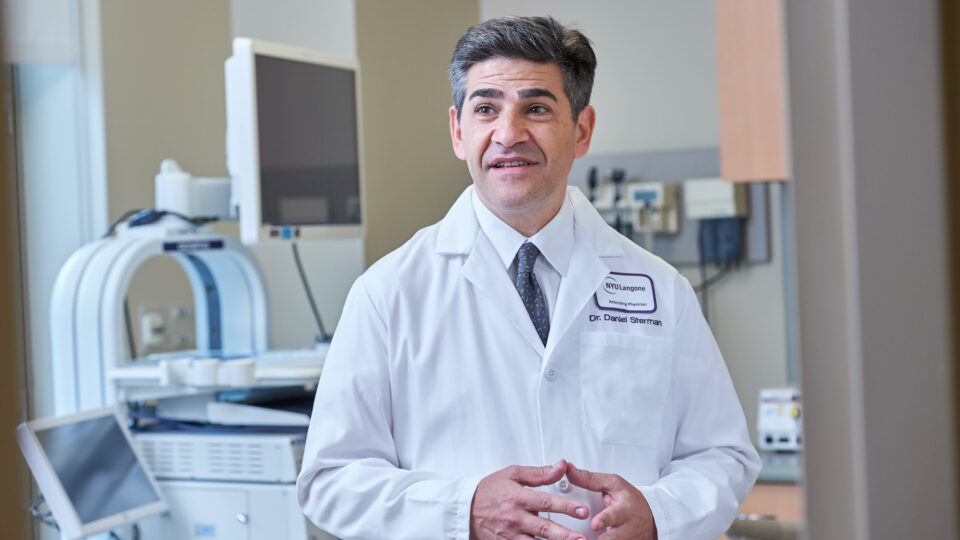Despite advances in breast cancer treatment that have significantly extended survival, much knowledge and research is still needed to adequately address the long-term impact of treatment and optimize women’s overall health. According to Elizabeth Comen, MD, newly appointed to the Breast Cancer Center at Perlmutter Cancer Center, those underaddressed areas are the product of a medical system that has historically overlooked the needs of women and minorities.
Dr. Comen joins NYU Langone Health to build multidisciplinary partnerships to enhance women’s health—in and beyond cancer care. An esteemed physician and author of the recently published All in Her Head, which explores the history of women’s healthcare, Dr. Comen discusses how her research and advocacy for women’s health equity informs her practice as a breast cancer oncologist.
The Dismissal of Women in Healthcare
Physician Focus: Dr. Comen, your research and recent book focus on inequities in women’s healthcare—specifically, the ways in which our healthcare system is designed to overlook or dismiss the medical needs of women. What led you to this research area?
Dr. Comen: My deep interest in the history of medicine traces back to my undergraduate education, when I majored in the history of science; I was fascinated by how scientific discovery and medicine are intertwined with the fabric of society, culture, and religion.
Later, as a breast oncologist, I began to hear heartbreaking stories of women dismissed or diminished within the medical system. For example, I saw a young woman whose diagnosis was delayed despite her concerns over a breast mass; she’d been told it couldn’t be cancer because she was “too young.” Countless patients have also expressed concerns about their sexual health going unaddressed or being brushed aside in the context of cancer treatment.
Stories like these motivated me to explore the complex legacy of women’s healthcare, and how our medical system has historically overlooked the unique experiences and needs of women.
“Women’s health has historically been the purview of the gynecologist, but in truth, we all—doctors across specialties—take care of women.”
Elizabeth Comen, MD
Women are from head to toe different from men, from our biology to our experience of disease. Yet beyond gynecology, the rest of medicine has been built around the 70-kilogram White male. Women’s health has historically been the purview of the gynecologist, but in truth, we all—gastroenterologists, cardiologists, neurologists, oncologists, doctors across specialties—take care of women.
A Legacy of Misogyny
Physician Focus: How can medicine better meet the healthcare needs of women?
Dr. Comen: It begins with simply recognizing the legacy of misogyny in women’s healthcare and the ways it manifests in the patient experience.
Female patients are often told their fatigue is due to being a new mother, their pain is in their head, or that it’s “just” depression or anxiety. When in reality these patients may be suffering from treatable medical conditions, compounded by the dismissal or neglect they face from their doctors.
With that recognition, there is an opportunity not only to change how we as clinicians approach the care of women but also to advance medical education and research by looking more closely at conditions or symptoms that we may be dismissing too frequently.
The good news is, there is a groundswell of public support to advocate for the rights of women as full participants in their own care.
Patient Engagement on a Personal Level
Physician Focus: How do some of these ideas take shape in the care you deliver as a breast oncologist?
Dr. Comen: The art of being an oncologist is in recognizing that no two biological processes exist in a patient in the same way. Taking care of women in this context requires understanding people individually, at a human level. It means thinking about their cancer not only in terms of survival, but also in terms of what it truly means to live. Understanding patients’ fears, joys, and aspirations is essential to providing holistic care.
I engage with patients on a personal level, exploring how each patient finds joy and what she is looking forward to. For example, perhaps there is a family wedding she wants to attend and wishes to avoid the heavy side effects of chemotherapy during that time.
“When discussing personalized medicine, we often focus on targeted therapy and genomics. However, truly personalized care also involves planning a patient’s treatment so that she can prioritize what matters most.”
When discussing personalized medicine, we often focus on targeted therapy and genomics. However, truly personalized care also involves planning a patient’s treatment so that she can prioritize what matters most to her in life.
Enhancing Quality of Life
Physician Focus: What advancements do you celebrate in current breast cancer treatment approaches, and what do you think should be prioritized going forward?
Dr. Comen: Breast cancer is an extraordinary example of a condition where we have greatly improved survival outcomes in both localized and metastatic disease, providing better, less toxic treatments. With that improved survival, we have an opportunity to help women thrive long after treatment, by prioritizing their overall health.
Historically, the system has focused on curing women of their breast cancer but ignored other elements of their posttreatment wellbeing, such as sexual health, which is incredibly important. I’m energized in thinking about how we will not only continue to extend patients’ lives, but also improve the quality of their lives.
Building Bridges Toward Equitable Treatment
Physician Focus: What do you hope to achieve at NYU Langone’s Perlmutter Cancer Center, both in research and in clinical care?
Dr. Comen: If optimal cancer care means looking at the whole patient rather than a fragmented group of systems, NYU Langone—which prioritizes holistic care and interdisciplinary collaboration—is an optimal place to practice medicine. I am looking forward to collaborating with Perlmutter Canter Center’s incredible researchers, scientists, and clinicians to continue to bridge specialties as we consider how to care for the whole patient over time.
Additionally, we have an opportunity to truly improve equity in cancer care. When you consider that Black women are 40 percent more likely to die from breast cancer, in large part due to access to resources, you begin to understand the intersectionality of misogyny, racism, and bias in medicine. With NYU Langone’s footprint both in and beyond New York City, we have an opportunity to meaningfully address disparities in breast cancer outcomes in novel and nimble ways.






